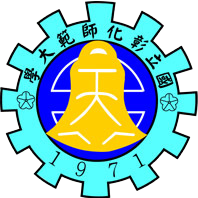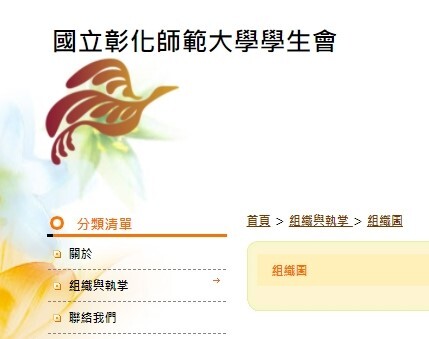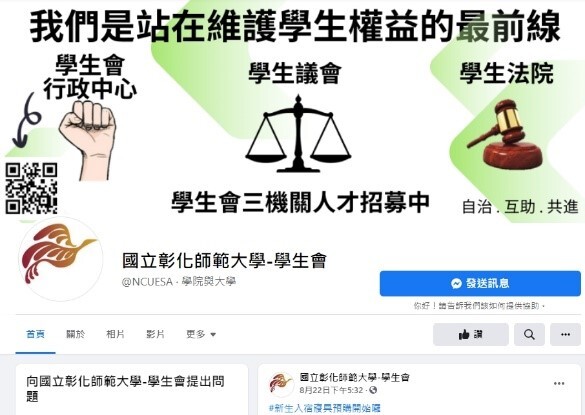SDG10.6.6 Support for underrepresented groups-2021
NCUE has provided guidance, consultation, or peer support programmes to support students, faculty, and staff from disadvantaged groups, as described below.
1. Services to support students with disabilities
In order to provide students with disabilities with more appropriate consulting and evaluation services and help them successfully complete their studies and improve their emotional, learning, social, and professional adaptation, the ‘Resource Classroom’ of NCUE is specially designed to arrange counselling during the learning process, and its work includes general, life, and academic counselling.
|
Statistics of various on-site service items of the Resource Classroom |
Number of students served |
|
Data inquiry |
20 |
|
3 |
|
|
Using aids |
3 |
|
Printing homework |
518 |
|
Self-study |
93 |
|
Consultation |
157 |
|
Examination service |
8 |
|
Data conversion |
12 |
|
Academic consultation |
66 |
|
Life consultation |
58 |
|
Schooling system transition consultation |
6 |
|
Counselling consultation |
1 |
|
Other |
158 |
|
Types of services provided by the Resource Classroom |
Number of students served |
|
Schoolwork counselling |
242 |
|
Examination service |
8 |
|
Study companion service |
605 |
|
Borrowing aids |
27 |
|
Textbook conversion |
20 |
2. Support services for indigenous students
In order to effectively provide various types of assistance and services, such as life, schoolwork, and employment counselling for students from indigenous ethnic groups (hereinafter referred to as indigenous students), NCUE established the Indigenous Students Resource Centre in 2017, and organised the above service activities 19 times in 2020, and 1,092 students participated in them. The service description is as follows:
2.1 Integration service of resources inside and outside the university: providing resources needed by indigenous students, and integrating them on the website of the Indigenous Students Resource Centre.
2.2 Life counselling: providing exclusive office space and full-time labour to assist indigenous students in solving problems in their daily life and applying for scholarships and subsidies on and off campus.
2.3 Schoolwork counselling: providing courses to enhance foreign language proficiency (publicised in indigenous students’ social network groups) and exclusive reading spaces before examinations.
2.4 Career planning and follow-up counselling: holding group career planning activities regularly to help students develop their future career planning .
2.5 Establishment of community organisations: establishment of the indigenous community, Ivala.
2.6 Tribe service: helping schoolchildren in indigenous communities improve their academic knowledge and future development.
2.7 Traditional culture cultivation and development: holding visiting activities and cultural courses regularly to cultivate the perspective of indigenous students’ culture.
2.8 Cultural promotion: holding lectures, singing competitions, and other activities to familiarise students of different ethnic groups in the university with indigenous culture.
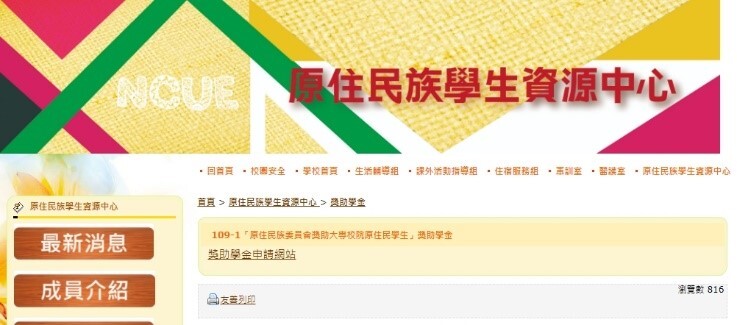
|
Website publication of information Integration service of resources inside and outside the university: providing resources needed by indigenous students and integrating them on the website of the Indigenous Students Resource Centre. http://student.ncue.edu.tw/files/11-1017-2254-1.php?Lang=zh-tw
|

|
Providing exclusive office space and full-time labour to assist indigenous students in solving problems in their daily life and applying for scholarships and subsidies on and off campus.
|
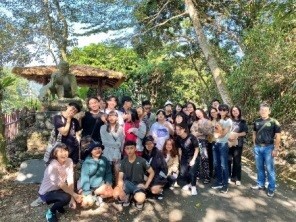
|
Holding visiting activities and cultural courses regularly to cultivate the perspective of indigenous students’ culture. For results of related activities, please refer to: http://student.ncue.edu.tw/files/11-1017-2282-1.php?Lang=zh-tw |
- Please refer to Annex 10.6.6A, Key Points on Setting up the Indigenous Students Resource Centre.
- Please refer to Annex 10.6.6B, Statistics on the number of students participating in various activities held by the Indigenous Students Resource Centre in 2020.
3. Services of student unions and associations
3.1 The Student Union has the right to send representatives to attend school meetings and make suggestions on university affairs
A student union organisation has been set up to implement the idea of student autonomy, cultivate democratic accomplishment, and promote the communication of opinions on campus and the equality of student associations. Its task is to manage students' public affairs, participate in various activities on behalf of all members, plan and coordinate university-level activities internally, coordinate the fund usage and audit of the student union, and send representatives to participate in school meetings. The organisation has the right to make suggestions on university affairs, suggest issues that reflect the opinions of most students, protect students’ rights and interests, and arbitrate student affairs.
|
|
|
- Please refer to Annex 10.6.6C, Articles of the Association of the Student Union of National Changhua University of Education.
3.2 Student service associations provide social services
Student service associations in NCUE, such as the Rural Service Society, Mountainous Service Society, Education Promotion Service Society, Wangwang Society, Baisha Scout Society (Luofu Society), Tzu Chi Junior College Youth Society, Fishing Village Service Society, Bai Hai Yu Goodwill Ambassador Group, and Chong De Youth Society, not only routinely provide related social services on weekdays, but also hold social service activities, such as activities in mountainous areas, activities in rural areas, and education promotion activities every winter and summer vacation.
- Please refer to Annex 10.6.6D, Number of service association participants.
